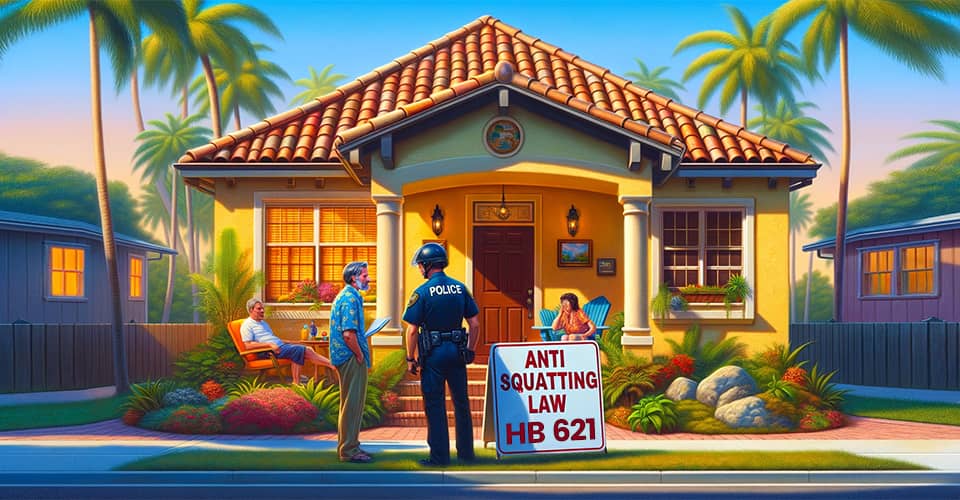The Nation’s New Leading Anti-Squatting Law: Florida HB 621 Overview
Governor Ron DeSantis is strongly supporting a new law in Florida called House Bill 621. He believes this law is crucial to stop what he calls the "squatters scam."
This bill makes it a priority to protect the rights of property owners against people who illegally live on their property. It represents a big change in favor of people who legally own their homes, aiming to stop squatting.
Starting July 1st, 2024, Florida will have tougher rules to protect property rights, showing its strong commitment to supporting homeowners.
These strict new rules are also expected to make Florida more appealing to people looking to buy a home, reinforcing its status as having the strongest anti-squatter law in the country.
What Does Florida's New Anti-Squatter Bill Say?
The Florida HB 621 bill, effective July 1st, 2024, changes laws to help remove people living illegally in homes.
Property owners or their representatives can ask for the sheriff’s help to quickly evict these "squatters", making sure they are not legitimate tenants, family members, or involved in a legal dispute about the property.
To start this process, owners must file a verified complaint.
The sheriff can arrest these occupants if needed and help during the eviction. Both the sheriff and property owners are not responsible for any damage to belongings during the eviction unless it was handled wrongly.
Moreover, the bill sets penalties for illegally living in a property, providing fake documents like lease agreements, or unlawfully selling, renting, or leasing homes. These changes start on July 1, 2024.
Previously, individuals occupying homes without permission could claim squatters’ rights after 30 days, creating a landlord-tenant relationship that made eviction difficult and time-consuming. Property owners had to engage in a lengthy civil eviction process once squatters obtained tenant status.
The new HB 621 bill simplifies the process, allowing for immediate intervention by law enforcement to remove squatters without the extended procedures previously required.

New Penalties for Squatting in Florida
Squatting in Florida just got a lot more serious. The new criminal penalties in the Florida squatting bill, which take effect July 1st, 2024, are as follows:
Penalty for Squatting in Florida
Punishable by up to 15 years in prison.
"A person who unlawfully detains, occupies, or trespasses upon a residential dwelling and intentionally causes damage of $1,000 or more is guilty of a felony of the second degree."
Penalty for Falsifying Document to Obtain a Lease in Florida
Punishable by up to one year in jail.
"Any person who knowingly and willfully presents a false document purporting to be a valid lease agreement, deed, or other instrument conveying real property rights, with the intent to remain on real property, commits a misdemeanor of the first degree."
Penalty for Fraudulent Sale or Lease in Florida
Punishable by up to 30 years in prison.
"A person who lists, advertises, sells, rents, or leases residential real property without lawful ownership or leasehold interest, knowing that they have no legal title or authority, commits a felony of the first-degree."
Florida Anti Squatting Laws Vs. California Squatter Rights
If you have a squatter on your property in California, it is going to be a long, long year.
Here's a comparison of the key aspects of removing unauthorized occupants from residential properties in California versus Florida, based on the latest legislative updates:
Dealing With a Squatter in California
In California, landlords must provide a written notice, which varies based on the type of violation and the duration of the tenancy.
For serious lease violations, a three-day unconditional notice to quit is used, and for month-to-month tenancies, a 30 or 60-day notice is required based on the duration the tenant has lived in the rental unit.
If the tenant does not comply with the notice, the landlord may proceed with an unlawful detainer lawsuit to legally evict the tenant.
Once the lawsuit is filed, you'll typically get a trial date after 20 days. Overall, the process from serving notice to eviction can take from a few weeks to a couple of months.
California law generally requires "just cause" for eviction, meaning that the landlord must have a valid reason, such as non-payment of rent or other serious lease violations.
The state has specific protections that prevent evictions without cause, ensuring tenants have the right to fight unlawful evictions.
California has strong tenant protection laws, including restrictions on evictions and requirements for landlords to provide relocation assistance if evicting tenants for no fault of their own, such as in the case of substantial remodels or owner move-ins.
Dealing With a Squatter in Florida
The Florida HB 621 bill enables property owners to quickly remove unauthorized occupants by requesting sheriff's assistance.
Property owners must submit a verified complaint and meet specific criteria to prove the occupant is unauthorized.
In Florida, property owners and sheriffs are protected from liability for damage to personal property during eviction unless the removal is wrongful. Additionally, sheriffs are authorized to arrest unauthorized occupants if there is legal cause.
Florida also establishes criminal penalties for unauthorized occupancy, presenting false documents, and fraudulent sale, rental, or leasing of properties, which adds a layer of legal consequences beyond the immediate removal of unauthorized occupants.
5 Other Helpful Policies That Benefit Florida Homebuyers
Here are some other helpful policies and benefits that make Florida an attractive state for homebuyers:
Homestead Exemption
Florida offers a substantial homestead exemption that reduces the taxable value of a primary residence by up to $50,000, resulting in lower property taxes for homeowners.
This exemption also provides additional benefits for certain groups, such as veterans and seniors, enhancing affordability and financial security.
No State Income Tax
Florida does not impose a state income tax, which can result in significant savings for residents. This financial benefit extends to all income levels, enhancing the overall affordability of living in the state.
Down Payment and Closing Cost Assistance
Florida provides several programs to assist with down payments and closing costs, making homeownership more accessible.
These programs are especially beneficial for first-time homebuyers and those who might not have substantial savings.
Protection Against High Property Taxes
Alongside the homestead exemption, Florida caps the annual increase in assessed value of homesteaded properties at 3% or the change in the Consumer Price Index (CPI), whichever is lower.
This policy helps prevent sudden spikes in property taxes, making financial planning more predictable for homeowners.
Veteran Benefits
Florida provides additional property tax exemptions for veterans, which can be as much as $5,000 on top of the regular homestead exemption. This is part of a broader suite of benefits aimed at making homeownership more feasible for veterans.
FAQs About Florida's Anti-Squatter Bill (HB 621)
What is the purpose of Florida's HB 621?
HB 621 aims to strengthen property owners' rights by providing a swift process to remove unauthorized occupants from residential properties.
This bill addresses the need for quicker remedies against squatting, which were seen as insufficient under previous laws.
Who can request the removal of unauthorized occupants under HB 621?
Property owners or their authorized agents can request the immediate removal of unauthorized occupants. They need to provide a verified complaint to the sheriff's office detailing the situation.
What conditions must be met to remove an unauthorized occupant?
Several conditions must be met, including proving ownership or authorized agency, the property being a residential dwelling, the occupants entering without authorization, and no ongoing legal disputes over the property.
What are the legal protections for property owners under this bill?
Property owners are protected from liability for any loss, destruction, or damage to personal property during the removal process unless the removal was conducted wrongfully.
Can a sheriff arrest unauthorized occupants under HB 621?
Yes, the sheriff can arrest unauthorized occupants if there is legal cause, such as trespassing, or if they have outstanding warrants.
What fees are associated with the removal process?
Sheriffs are entitled to a fee for serving a notice to vacate, similar to serving a writ of possession. Additionally, if the sheriff is requested to stand by during the eviction, they may charge a reasonable hourly rate.
What are the consequences for unauthorized occupants under HB 621?
Unauthorized occupants face increased legal risks, including potential arrest and harsh penalties for squatting, presenting false documents, or damaging property.
What should a property owner do if the eviction process is wrongfully used?
If an eviction process under HB 621 is misused, affected individuals can bring a civil action for wrongful removal, potentially recovering damages and associated legal costs.
Does HB 621 affect the rights of tenants under valid leases?
No, the bill explicitly excludes current or former tenants who have a legal rental agreement from being considered unauthorized occupants.
When does HB 621 take effect?
HB 621 is scheduled to take effect on July 1, 2024, giving property owners and law enforcement time to prepare for the changes.
Bottom Line
If you're a professional squatter in Florida, it's probably time to find a new state.
Florida's new anti-squatter bill, HB 621, showcases the state's commitment to protecting property owners, reflecting a broader trend that's attracting new homeowners in 2024.
This legislation is part of why Florida is seeing a surge in residential investments, as it ensures that property rights are robustly protected against unauthorized occupancy.
For those considering relocation or investment, the introduction of bill HB 621 provides an additional layer of security for homeowners.
If you want to benefit from protections like those in HB 621, consider making Florida your next home destination. Explore your options and join the growing community of satisfied homeowners in the Sunshine State.
Contact MakeFloridaYourHome for more information and to start your journey to homeownership in Florida.
With over 50 years of mortgage industry experience, we are here to help you achieve the American dream of owning a home. We strive to provide the best education before, during, and after you buy a home. Our advice is based on experience with Phil Ganz and Team closing over One billion dollars and helping countless families.

About Author - Phil Ganz
Phil Ganz has over 20+ years of experience in the residential financing space. With over a billion dollars of funded loans, Phil helps homebuyers configure the perfect mortgage plan. Whether it's your first home, a complex multiple-property purchase, or anything in between, Phil has the experience to help you achieve your goals.


 By
By  Edited by
Edited by 






